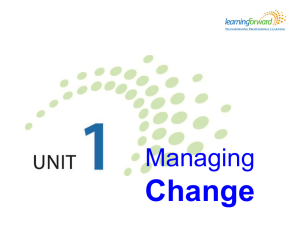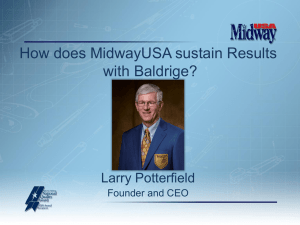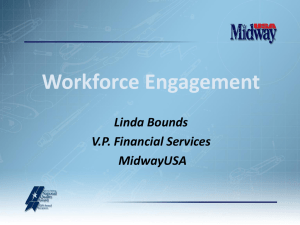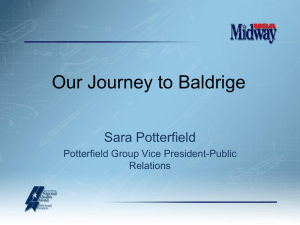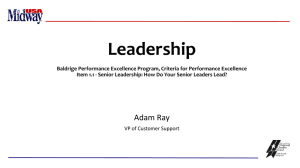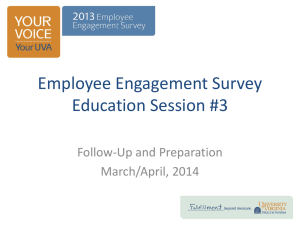Employee Satisfaction and Engagement Process
advertisement
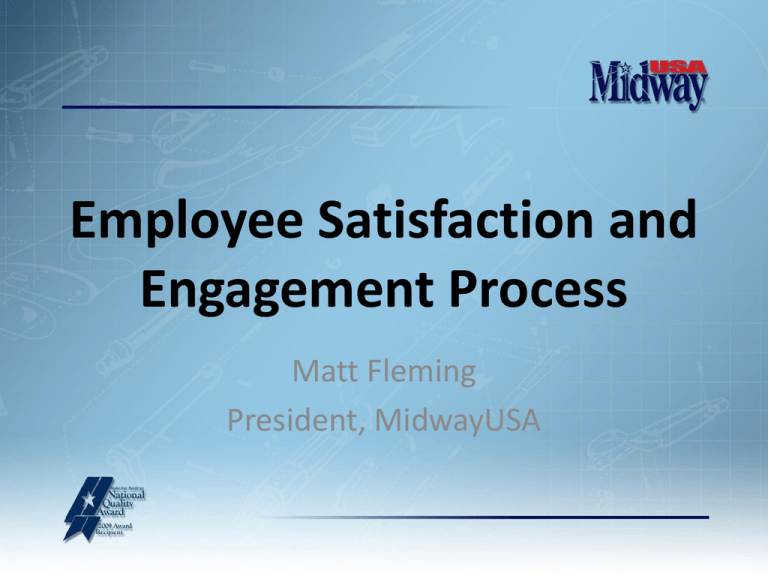
Employee Satisfaction and Engagement Process Matt Fleming President, MidwayUSA Overview 1. Satisfying and Engaging Employees is a Process (Handout) 2. 3. 4. 5. 6. 7. 8. It’s EXTREMELY Important It Requires Top-Level Involvement It’s a Journey, not a Destination Stay True to your Vision, Values and Culture Find the Appropriate Balance Take Swift Action You can’t Communicate Enough The Question “What approach do you use to achieve and maintain such high levels of Employee Satisfaction and Engagement?” The Answer 1. The Employee Satisfaction and Engagement Process 2. What we’re doing today (The 90-Day Cycle) 3. What we’ve tried and not liked a) The 1000-page report b) Little Top-Level Involvement in the Process c) Not enough Communication The Process 1. Set the Direction 1. Done Annually in January 2. Validate Mission Statement (Vision, Purpose, Mission and Values) (Handout) 3. Validate Culture Statement (Handout) 4. Validate Employees as Key Stakeholders 5. Benchmark E-Sat and Engagement (Baldrige Winners) 6. Validate Employee Satisfaction as #2 Company Goal (Handout) 7. Set the Employee Satisfaction Goal 8. Validate Company Strategies 9. Review Results and Goals 2. Design the Survey 1. Done Annually in January 2. Determine Employee Key Requirements a) b) c) d) e) Take a Zero-Based Approach Ask Employees in Focus Groups Remember the word “Key” (10 – 15) Don’t forget about Culture (Alignment) Can’t build your Survey until you have these 3. Build/Buy Align Survey 3. Communicate Survey 1. 2. 3. 4. 5. 6. Why we have a Survey (Importance) How the Process works Our Goal What we do with the Results When, Where and How Handout 4. Administer Survey 1. 2. 3. 4. All Employees > 30 Days Encouraged, but not Required Invitation Letter has URL and Login Set up Common Workstations for Employees without Workstations 5. 1-Week to take Survey 6. It’s important 5. Receive/Analyze Results 1. “The Results Are In” Communication a) b) c) d) e) Receive 1-Week after Survey Ends Communicate Results to SLT Communicate Results to Organization Post Results on Intranet Includes Segmentation 2. Identify “Topics for Focus” a) Low Scoring Questions for each Department b) Low Scoring Areas for the Organization 6. Conduct Focus Groups 1. Assemble Focus Groups a) b) c) d) Focus Groups for each Work Group (8) Send Invitation Letter Email Plan to Organization Employees selected for Focus Groups get Input from Peers and serve as their Representatives 2. Have a Clear Agenda (Handout) 3. Focus on Processes and Policies, not Complaints 4. Lead and Teach when Appropriate 7. Take Action 1. Review/Synthesize Focus Group Results a) Top-3 Ideas from each Group b) Top 5-10 Ideas for the Organization 2. Communicate Results to Organization 3. SLT Reviews Focus Groups Results in Quarterly Workforce Focus Meeting 4. SLT Creates and Prioritizes Action Plans 5. Departments Take Responsibility for Executing Action Plans 6. Also Consider other Listening Posts (HR Analysis Matrix, Innovation, Direct Feedback, etc.) 8. Communicate Improvements 1. Communicate what Action Plans are added to Strategic Plan, Department Plans, etc. 2. Communicate Timing of Action Plans 3. Communicate and Celebrate when Improvements are made 4. Address the Tough Topics Review, Improve and Repeat Process 1. Validate Alignment of Process to Vision, Values, Culture and Direction 2. Discuss Improvements to Process based on alignment and Employee Feedback 3. It’s a continuous cycle of listening, learning and improving Employee Satisfaction & Engagement (Total Company) 100% Results Better 90% 80% Percent Score 70% 60% 50% 40% 80% 82% 81% 2009 2010 2011 90% 90% 90% 2013 2014 2015 84% 30% 20% 10% 0% MidwayUSA Goal 2012 NBRI Average Baldrige Best Practice Baldrige Average Take-Aways 1. 2. 3. 4. 5. 6. 7. 8. Our Approach (the Process) It’s Extremely Important Must have Top-Level Involvement It’s a Journey, not a Destination Stay True to your Vision, Values and Culture Find the Appropriate Balance Take Swift Action Communicate!

